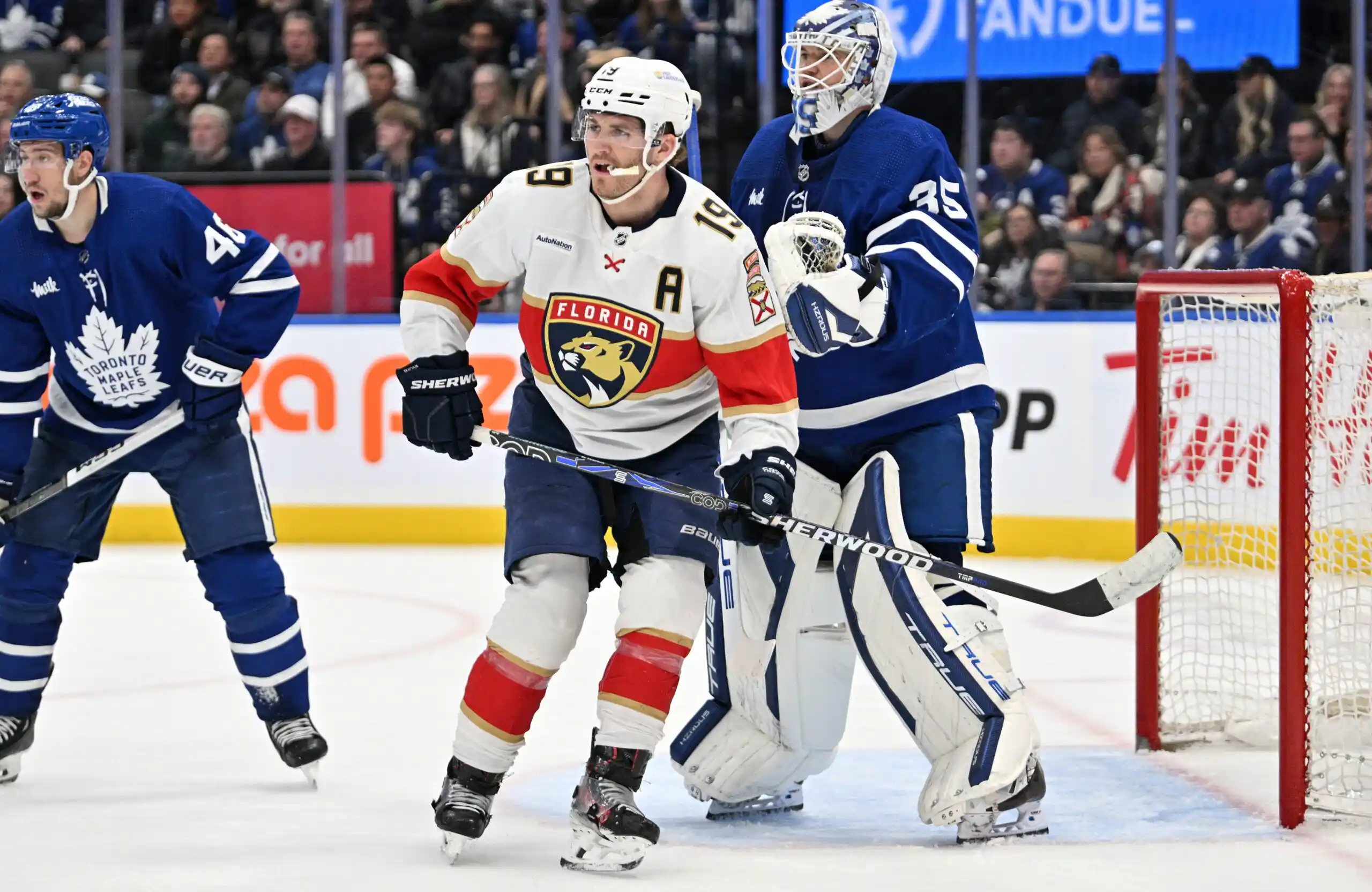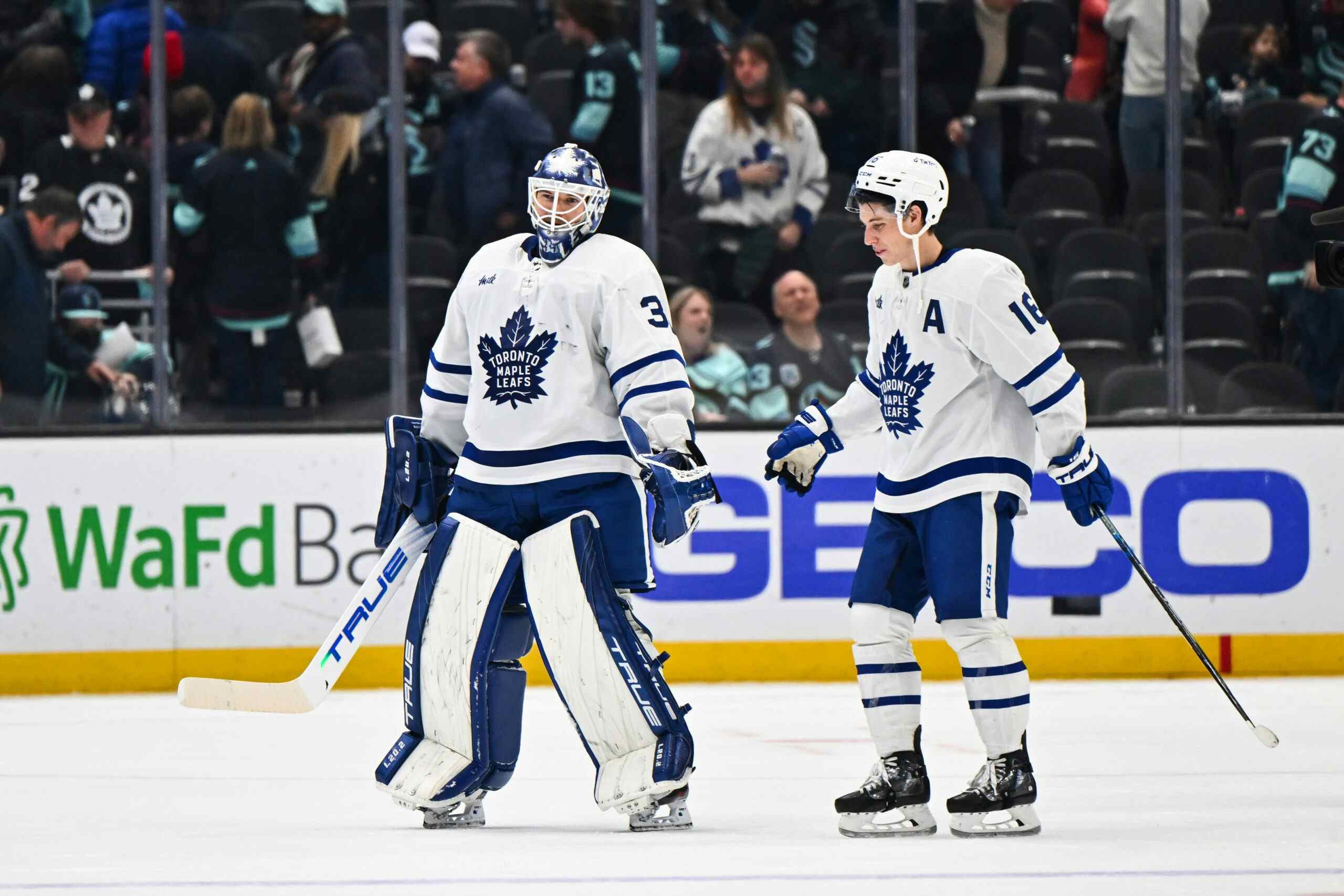Born and Bred

Editor’s Note: This is an entry in our search for Fresh Blood at TLN. Every possible contributor will get three posts to strut their stuff and then we’ll ask you readers to help us choose who is going to join.
By: John Lofranco @jtlinmtl
One positive thing about being a Leaf fan in Montreal is that I get to experience the wacky Montreal media and fanbase, and that gives me some much needed perspective on what gets written about the Leafs by Toronto-based "journalists" and the bulk of the Leaf-loving population in Southern Ontario.
The best, most recent example of this was the "Randy Cunneyworth doesn’t speak French" debacle. I get that it is somewhat of a cultural issue, but this tempest in a wine glass (French equivalent of teapot?) was mostly media-created. Why would they do such a thing? Because they are jerks, mostly, I think. Also, to get readers, and partially, in some cases, for political purposes. And of course as soon as the media kicks it off, that mushy middle of under-informed, overly-passionate fan runs with it. I won’t get into the whole debate here, but suffice it to say, it was nice to see someone else’s media being stupid for once.
But we of the Leafs Nation are not without our own, stupid, cultural controversy.
It is sometimes heard, from the mouths of fans who probably don’t like hockey very much, or reporters who don’t know hockey very much, that the Toronto Maple Leafs under Brian Burke are "too American" and that the Leafs need more "home-grown talent." That sort of argument is right up there with "the Habs need a French coach" and “let’s sign Ville Leino to an expensive long-term contract.” (Trading Hall Gill for Blake Geoffreon might not be so bad, though Habs fans who hope he can fill the shoes of his grandfather and great-grandfather should consider that a) he was born in Florida and b) he’s not nearly as good as his ancestry).
I suppose the noises got loudest in the fall when an "American interest" (that most insidious of interests) was rumoured to be looking to purchase MLSE. This got fans riled up and saying some truly Montreal-worthy bits of ridiculousness:
"I’m a little bit horrified by the whole thing," said Decoste. "Hockey is a big part of Canadian identity and if we can’t hang on to the Leafs, there’s something seriously wrong."
This is from a guy who was "occupying" Toronto, so I suppose we can take it with a grain of salt. But if he is representative of even some of the fan base, well, there is something seriously wrong.
Some non-hockey reporters in Boston were talking about it, too. I assume they are non-hockey reporters because they remind us about the Leafs’ last cup in 1965…Wait, what? What’s useful about that link is Burke’s comment: "We’re looking for hockey players. Period." That’s exactly what Pierre Gauthier should have said, but didn’t, by the way.
Don Cherry got into the act as well, as his "feud" with Burke and Wilson turned around the fact that Wilson didn’t applaud the troops (presumably because he’s American) while "good Canadian boy" Rob Zettler did. Also, both Kadri and Zigomanis are from Southern Ontario, and Cherry is always raging that those two should not be in the minors.
The question remains though, would it help to have more Canadians (Or Ontarians or Torontonians) on the Leafs, or more Quebecers on the Habs? A Habs blog has looked at the French side of the question, analyzing both trends of Quebec-born players playing for Montreal, and how useful they are. (Hint: lately, not so useful.)
What I’d like to look at is how many "local" players a team should expect to have, based on league-wide demographics, and also, how many teams do have hometown boys playing for them. I’m only going to look at this season. I’ve used the rosters from the teams’ webpages to make a chart of Canadian, American and European players, and added a column for “local” players, that is players from that province or state. I’ve lumped European players together because none of them will be “local” so there’s no need to distinguish.
(Side question, why are there no European coaches in the NHL? A thought for another day.)
Also, I’ve allowed players from Saskatchewan to double count as “local” for both the Alberta teams and the Winnipeg Jets. “Local” also means the right nationality, so for example a player born in Buffalo doesn’t count as local for the Leafs, but a player from Sudbury would. It’s not a perfect system
For league averages, I’ve just used my own counting, but if you want a more in-depth look at NHL player demographics and trends, in terms of both country and province of origin, check out Quant Hockey.
Here’s my chart, arranged in order of rank (because presumably people care about this because they think having more local players will result in a better team…they are wrong, by the way), with averages at the bottom for league-wide, Canadian teams, and the top, middle and bottom third of the standings.
| Team | Canada | USA | Euro | Toronto | Local | Rank |
|---|---|---|---|---|---|---|
| Detroit | 9 | 5 | 12 | 1 | 2 | 1 |
| New York City | 9 | 8 | 6 | 5 | 1 | 2 |
| Vancouver | 14 | 6 | 6 | 4 | 2 | 3 |
| St. Louis | 15 | 5 | 4 | 7 | 0 | 4 |
| Boston | 17 | 3 | 5 | 7 | 1 | 5 |
| Nashville | 11 | 6 | 6 | 6 | 0 | 6 |
| Philadelphia | 13 | 4 | 8 | 3 | 0 | 7 |
| San Jose | 14 | 6 | 5 | 4 | 0 | 8 |
| Pittsburgh | 14 | 6 | 3 | 4 | 0 | 9 |
| Newark | 9 | 6 | 11 | 2 | 0 | 10 |
| Ottawa | 11 | 6 | 6 | 3 | 2 | 11 |
| Chicago | 15 | 2 | 6 | 6 | 0 | 12 |
| Fort Lauderdale | 17 | 2 | 8 | 7 | 0 | 13 |
| Los Angeles | 15 | 9 | 2 | 5 | 0 | 14 |
| Toronto | 12 | 8 | 4 | 0 | 0 | 15 |
| Phoenix | 13 | 2 | 7 | 3 | 0 | 16 |
| Calgary | 18 | 4 | 6 | 6 | 9 | 17 |
| Washington | 11 | 6 | 8 | 4 | 1 | 18 |
| Denver | 17 | 4 | 4 | 6 | 0 | 19 |
| Dallas | 11 | 6 | 7 | 1 | 0 | 20 |
| Minneapolis | 19 | 5 | 3 | 1 | 5 | 21 |
| Winnipeg | 10 | 6 | 6 | 1 | 2 | 22 |
| Anaheim | 10 | 4 | 8 | 5 | 0 | 23 |
| Tampa Bay | 15 | 6 | 3 | 3 | 0 | 24 |
| Long Island | 8 | 10 | 6 | 6 | 1 | 25 |
| Montreal | 11 | 5 | 10 | 3 | 3 | 26 |
| Buffalo | 8 | 8 | 7 | 4 | 1 | 27 |
| Raleigh | 10 | 8 | 6 | 6 | 0 | 28 |
| Edmonton | 15 | 4 | 5 | 4 | 6 | 29 |
| Columbus | 17 | 5 | 5 | 4 | 0 | 30 |
| Overall avg | 12.9 | 5.5 | 6.1 | 4.0 | 1.2 | |
| Top 10 avg | 12.5 | 5.5 | 6.6 | 4.3 | 0.6 | |
| Mid 10 avg | 14.0 | 4.9 | 5.8 | 4.1 | 1.2 | |
| Bot 10 avg | 12.3 | 6.1 | 5.9 | 3.7 | 1.8 | |
| Canadian avg | 13.0 | 5.6 | 6.1 | 3.0 | 3.4 |
Things I’ve noticed
(numbers are based on rosters and position in the standings as of February 17th, 2012)
1. The Leafs are the only team not to have ANY players from Southern Ontario. Admittedly, that’s odd. The league average is about 4 players from the area. Among Canadian teams, it’s 3.
2. Toronto does have a few more than the average number of American players. Actually, we have the same number as the Rangers do, and it doesn’t seem to be hurting them.
3. The top 10 teams in the league have a slightly higher average of players from Southern Ontario, but again, it’s slight (4.3, 4.1 for the middle 10, and 3.7 for the bottom 10). So there is a small trend for better teams to have more Ontarians, but the difference is marginal.
4. Canadian teams don’t have, on average, more Canadian players than the rest of the league.
5. Canadian teams do tend to have, on average, more “local” players than the rest of the league. That’s in large part due to Calgary overloading on Alberta and Saskatchewan boys. Unfortunately for them, it’s not exactly a winning strategy.
6. It seems that, league-wide, the more local players you have, the worse your position in the standings (as of February 17th), but again, the difference isn’t large: of 0.6 local players for teams in the top 10, 1.2 local players for those in the middle 10, and 1.8 for those in the bottom 10 is not much of one, statistically, but it is a downward trend, I guess. If Minnesota moves up into the middle 10, that would skew those numbers quite a bit, however, so there is that to consider.
7. Calgary, Edmonton and Minnesota have really stacked their teams, relative to the rest of the league, with local talent.
8. Only 13 teams in the league actually have local players on their rosters, and four of those are in the top 10 in the league.
So I went through all the trouble to make the chart, but the conclusion, as you may have guessed, is that team composition is roughly the same league-wide, and it doesn’t make a difference with respect to winning games. I recognize that in some cases, perhaps in smaller markets like Minnesota, Edmonton or Calgary, they might want to use local talent for marketing purposes. And maybe in Montreal there are local pressures that might lead management to think it would be a good idea to add some home-grown players, even if there doesn’t seem to be a correlation between how well the team does on the ice and the team’s revenues overall.
In Toronto, there are certainly local pressures. The pressures aren’t cultural, like in Montreal, but based on volume: so many fans, so much love, so much desperation and grasping at straws. In the end though, as Brian Burke says, what you want on your team are hockey players. Period.
One final editorial comment: speaking of hockey players, as the trade deadline approaches, of course Toronto will be the centre of any and all speculation. What’s good to know is that Brian Burke won’t bow to any kind of pressure, other than that of building a hockey team that is prepared to achieve long-term success. With that in mind, if the Leafs don’t need more Canadians, or Torontonians on the team, what do they need? In my opinion, nothing. Just wait. Now is not the time to make any big moves. Yes, our goaltending is poor. But do NHL-calibre goaltenders spring, ready-made from the womb? No. Is Jonus Gustavsson too old to be likely to get any better? Maybe. This is a young team, and with another year of experience, they will get better. The goaltending will get better, too. We can afford to wait. Changes are needed, but not under the pressure of the trade deadline, not as a reaction to a mid-season losing streak, and, certainly not in order to favour any sort of geographic demand
Recent articles from Pension Plan Puppets





